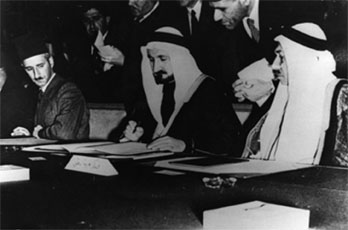
March 22, 1945
On March 17, 1945, the Preparatory Council of the Arab League began meeting in Cairo to draw up a charter for pan-Arab cooperation. Six Arab states — Egypt, Transjordan, Iraq, Lebanon, Saudi Arabia and Syria — participated in the meetings which were chaired by the Egyptian Prime Minister. Musa al Alami, a Jerusalem-born Palestinian politician and administrator who had worked in the British High Commissioner’s Office, was the representative of the Palestinian people. A seventh country, Yemen, was not present for the deliberations but would be an original signer of the constitution on March 22.
After days of deliberation, agreement was reached on two seemingly conflicting issues: pan-Arab nationalism and the sovereignty and independence of each member state. The Arab League Constitution was signed in a ceremony marked by speeches from each of the six states represented at the signing ceremony. Al Alami did not sign the constitution; Yemen would sign the pact on May 5.
The constitution signatories agreed to settle disputes between member states, collaborate on economic, cultural and social welfare issues, and safeguard the independence of its members. Arab League headquarters were established in Cairo and regular sessions were scheduled to be held biannually.
A special Annex on Palestine was added to the charter which stated, Even though the outward signs of [Palestinian][SKW1] independence have remained veiled as a result of force majeure [building of the Jewish national home],” the Arab League allowed an Arab delegate from Palestine to participate in its work until this country enjoys actual independence. In December 1945, the Arab League declared a formal economic boycott of Jewish products and goods, which remained in force well beyond the signing of the 1979 Egyptian-Israeli and 1994 Jordanian-Israeli Treaties.
In 2014, there were twenty-two states in the Arab League, which continued to reject the recognition of the State of Israel. On March 9, 2014, the Arab League backed Palestinian President Mahmoud Abbas’ refusal to recognize Israel as a Jewish state as a precondition in peace negotiations. Nabil Elaraby, the head of the Arab League, stated, “The council of the Arab League confirms its support for the Palestinian leadership in its effort to end the Israeli occupation over Palestinian lands, and emphasizes its rejection of recognizing Israel as a ‘Jewish state’.”
